As a parent, you want the best for your child, including helping them make friends. If your child is having trouble making friends in preschool, you can help. Early social skills are key for a child’s happiness and success.
By focusing on social skills, you can help your child build friendships and confidence. This lays a strong foundation for their future. It’s important to encourage social skills in preschoolers.
Key Takeaways
- Encouraging social skills in preschoolers is vital for their future success and happiness
- Preschool social development plays a significant role in helping your child make friends
- As a parent, you can help your child develop essential social skills through various activities
- Early social development can help build your child’s confidence and self-esteem
- By focusing on preschool social development, you can give your child a strong foundation for future success
- Helping your child make friends in preschool can have a lasting impact on their social skills and relationships
Understanding the Importance of Early Social Development
As a parent, you want the best for your child. Building friendships is key for their growth. Social activities for preschoolers help their emotional and psychological development.
By encouraging social interaction, you help your child develop important skills. These skills are vital for their future success.
Why Social Skills Matter at Preschool Age
Social skills are vital for preschoolers. They help in developing emotional intelligence and empathy. These skills are essential for forming strong relationships and achieving success.
The Link Between Social Skills and Future Success
Research shows a strong link between social skills and success. Children with good social skills do better in school and have better mental health. By focusing on socialization, you help your child succeed in life.
Key Social Milestones in Early Childhood
Children should reach several social milestones early on. These include developing empathy, learning to share, and building friendships. They also need to learn cooperation and teamwork.
- Developing empathy and understanding for others
- Learning to share and take turns
- Building friendships with others
- Developing cooperation and teamwork skills
By promoting social interaction, you help your child reach these milestones. This way, they develop the skills needed for success.
Signs Your Preschooler May Need Help With Social Skills
As a parent, you want your child to develop social skills at a normal pace. Developing social skills in early childhood is key for their future. You might wonder when your preschooler needs extra help with social skills for preschool age. Signs include trouble sharing, being too aggressive, and having trouble talking.
Seeing these signs can be worrying, but spotting them early is vital. You can start by watching your child during playdates or at preschool. If you see any of these signs, it might mean your child needs social skill help:
- Having trouble sharing or taking turns
- Being too aggressive, like hitting or pushing
- Having trouble talking, like expressing feelings or needs
Knowing these signs lets you help your child early. You can sign them up for preschool that focuses on developing social skills in early childhood. Or, you can work with a therapist to tackle specific social issues.
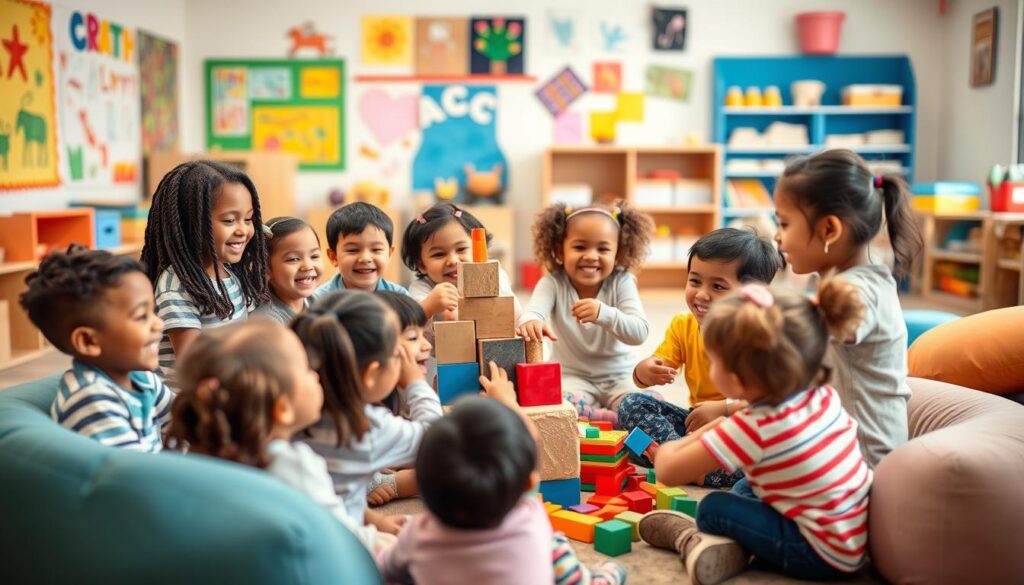
Every child grows at their own speed, and some need more help. By spotting these signs and acting early, you can give your child a strong start for social success later on.
Creating Opportunities for Social Interaction
As a parent, you are key in helping your child grow social skills. Simple steps like hosting playdates or enrolling in preschool can help. These actions help your child feel confident, make friends, and set them up for success.
There are ways to encourage your child’s social growth. Here are some tips:
- Encourage your child to share and take turns with others
- Model positive social behavior, such as using good manners and being kind to others
- Provide opportunities for your child to interact with other children, such as playdates or group activities
By using these strategies, you can help your child develop important social skills. Always watch over your child during these interactions. Offer help and support when they need it.
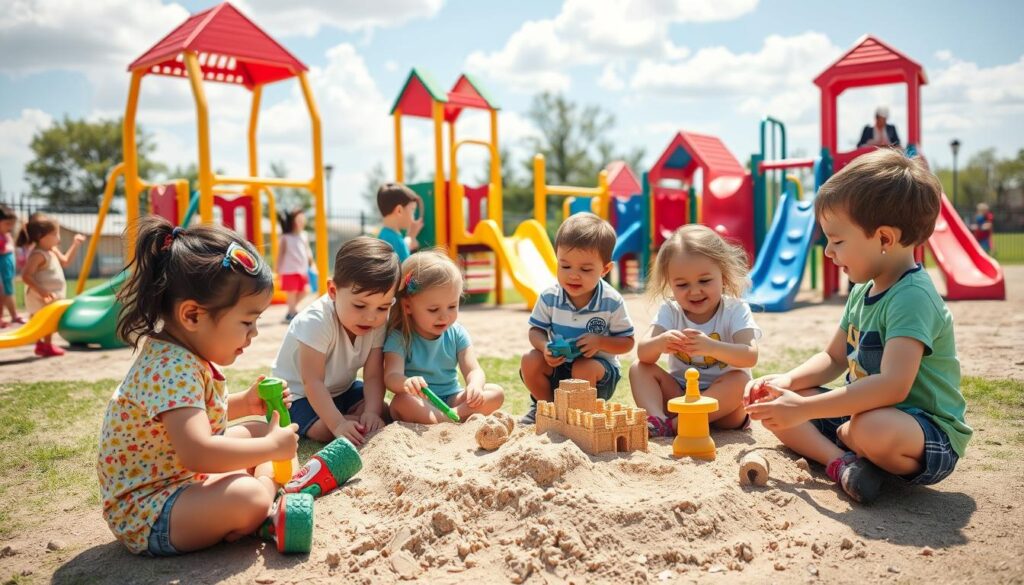
Also, make the most of preschool time for your child’s social growth. You can do this by:
| Activity | Benefits |
|---|---|
| Playdates | Helps children develop social skills, such as sharing and taking turns |
| Group activities | Provides opportunities for children to interact with others and build friendships |
| Preschool programs | Offers a structured environment for children to learn and develop social skills |
Essential Social Skills to Foster in Your Preschooler
As a parent, you want your child to grow well socially. Teaching them important social skills is key for their emotional and mental growth. These skills help them make friends and set a strong base for their future.
Key skills include sharing, taking turns, and working together. These are essential for your child to make friends and handle social situations. You can teach these by showing good behavior and giving chances for them to practice.
Here are some ways to encourage social skills in your preschooler:
- Encourage sharing and taking turns during playtime
- Model positive social behavior, such as cooperation and empathy
- Provide opportunities for your child to interact with others, such as playdates and group activities
By teaching social skills, you help your child succeed in life. Be patient and supportive, and give them chances to practice. With time and effort, they’ll learn to make friends and do well in social situations.
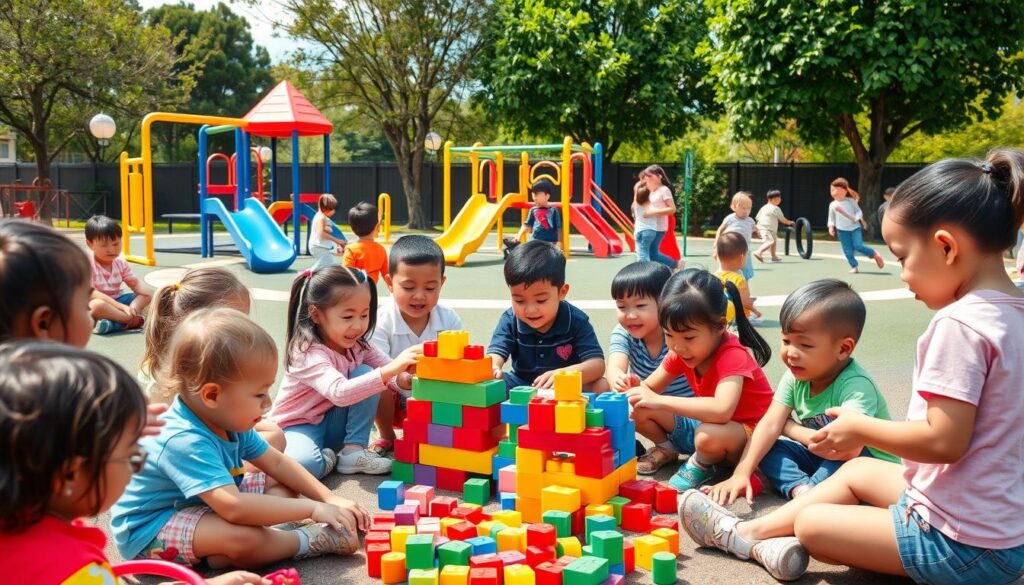
Teach your child to cooperate, empathize, and communicate. This way, they can build strong friendships and lay a solid foundation for their future.
Encouraging Social Skills in Preschoolers Through Play
As a parent, you want your child to have good social skills. This is key for their future success. Play is a great way to help them learn to share, work together, and feel confident around others.
Play can also help your child learn to communicate, understand others, and solve problems. For instance, you can use puppets or stuffed animals to practice different social situations. This teaches your child how to handle various social challenges.
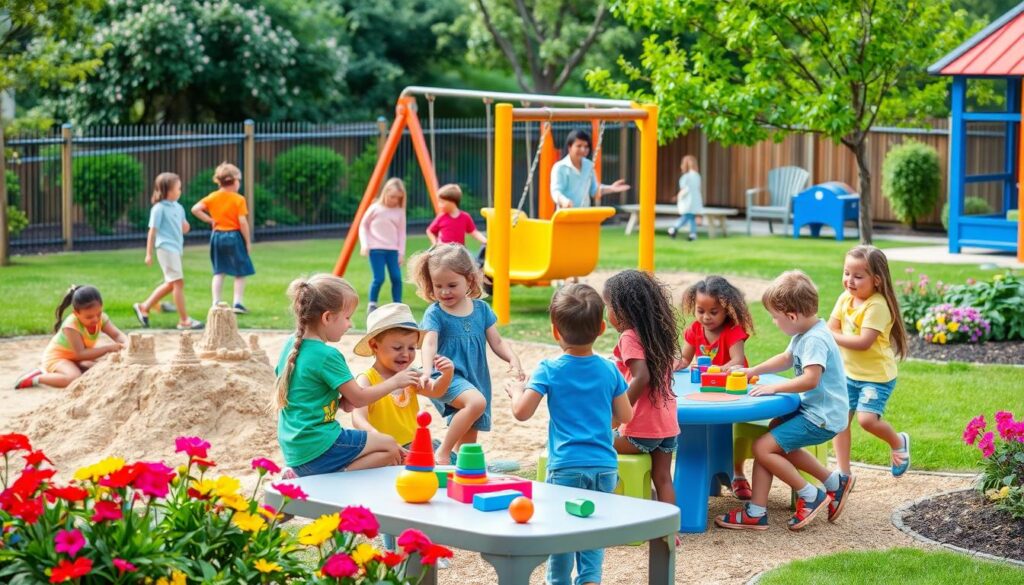
- Group games like Simon Says or Red Light, Green Light that help build confidence
- Using toys like blocks or puzzles to teach sharing and teamwork
- Encouraging imaginative play, such as dress-up or pretend cooking
By adding these activities to your child’s playtime, you help them develop important social skills. These skills are essential for making friends and getting along with others.
Managing Social Challenges and Conflicts
As a parent, you want your child to have good social skills. This includes developing social skills in early childhood. But, social problems and fights are common, even for young kids. It’s key to teach them how to handle these issues.
For social skills for preschool age, it’s vital to give your child the right tools. Teach them to share their feelings, listen to others, and solve problems peacefully.
Here are some tips to help you manage social challenges and conflicts in your preschooler:
- Encourage open communication: Talk to your child about their feelings and concerns, and listen to their perspective.
- Model positive behavior: Show your child how to resolve conflicts peacefully by modeling positive behavior yourself.
- Teach problem-solving skills: Encourage your child to think critically and come up with solutions to problems.
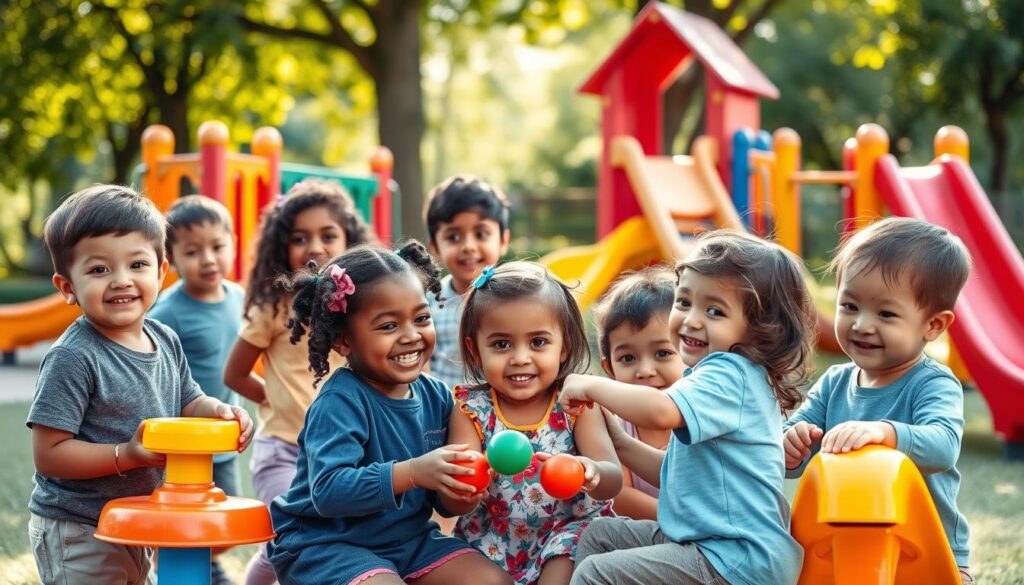
By following these tips and supporting your child, you can help them develop strong social skills for preschool age. They’ll be able to handle social problems and conflicts with confidence.
The Role of Parents in Social Skill Development
As a parent, you are key in helping your child grow socially. You can do this by showing good social behavior and guiding them. It’s important to help preschoolers develop social skills. This helps them feel confident and make good friends.
To help your child make friends, start by being a good example. Share, take turns, and be kind. Also, help them during social times like playdates and group activities. Give them encouragement and guidance.
Here are some ways to support your child’s social growth:
- Encourage sharing and taking turns
- Model positive social behavior, such as kindness and empathy
- Provide opportunities for social interaction, such as playdates and group activities
By following these tips, you can help your child succeed in preschool and later. Remember, social development is a big part of your child’s growth. With your help, they can do well.
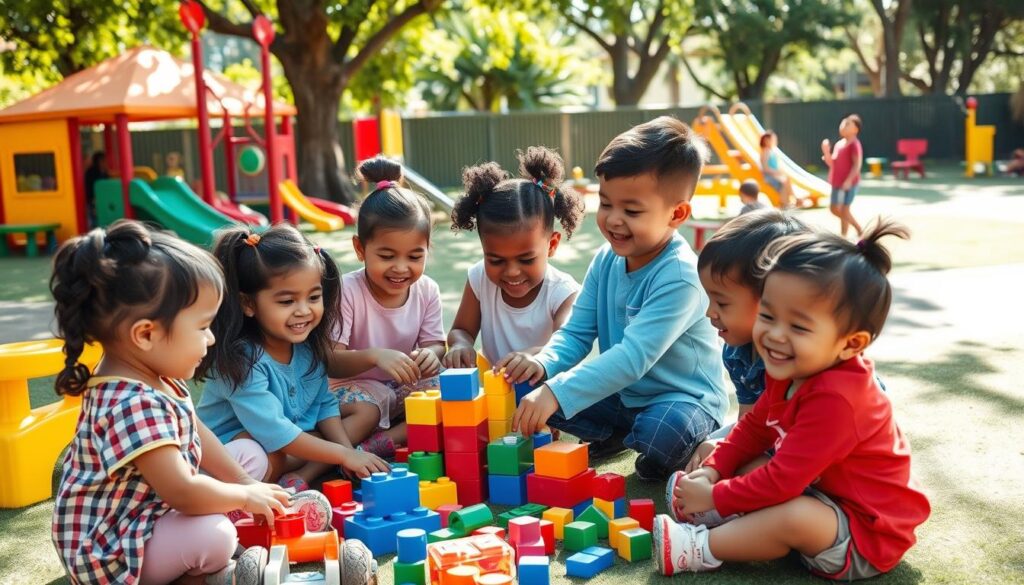
Building Emotional Intelligence for Better Friendships
As a parent, you want your child to have strong friendships. Emotional intelligence is key in this. Teaching your child to understand and manage their feelings helps them make better friends. 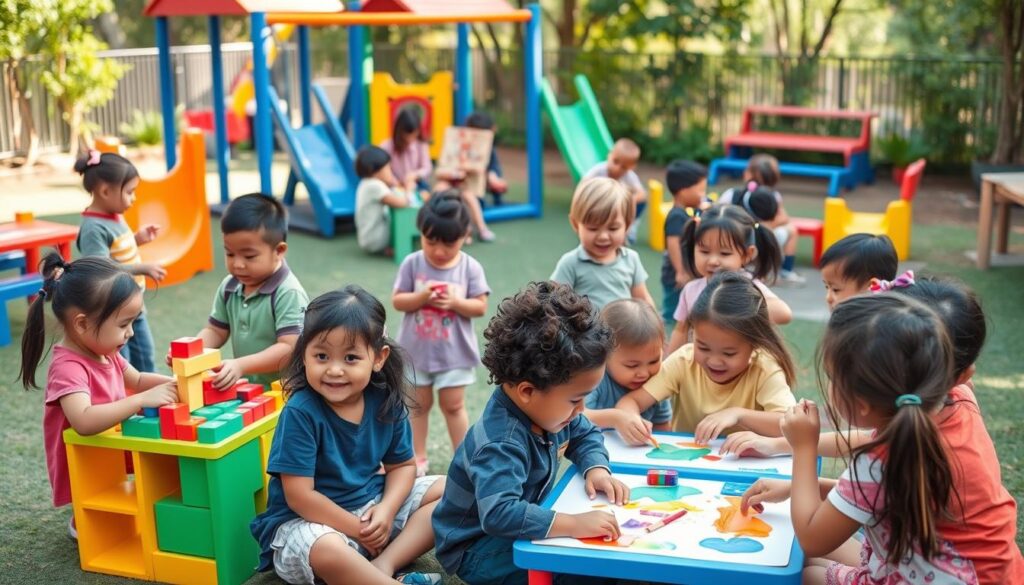
It’s important to help your child get along with others. You can do this by getting them involved in socialization activities for preschoolers. Activities like playdates, group games, and community events are great. They help your child learn to share, work together, and talk well.
Here are some friendship building tips for young children:
- Encourage empathy and understanding towards others
- Teach your child to express their feelings and needs effectively
- Model positive social behavior, such as kindness and respect
By following these tips and getting your child involved in social activities, you can help them develop emotional intelligence. This is important for making lasting friendships. Remember, every child is different. So, it’s important to adjust your approach to fit their unique needs and personality.
| Activity | Benefits |
|---|---|
| Playdates | Develops social skills, like sharing and cooperation |
| Group games | Encourages teamwork, communication, and problem-solving |
| Community activities | Expands social circle, promotes social interaction, and builds confidence |
Conclusion: Nurturing Your Child’s Social Growth
Encouraging social skills in preschoolers is key for their growth and success. By giving them chances to meet others, showing them good social habits, and helping them through tough times, you help them make friends. This sets them up for success in social situations.
Remember, teaching social skills is a journey, and you’re a big part of it. Keep helping your child understand their feelings and celebrate their wins. With your support, your child will become confident and ready to face the world.
